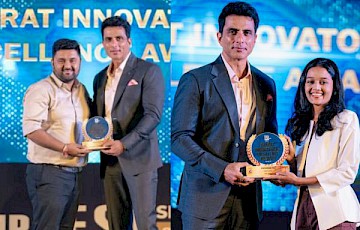2 January 2025
Research Shows Farmers' Experience Offsets Climate Change Income Loss

An additional 10 days of extreme temperatures can reduce the income of less experienced farmers by over 11 per cent. Yet, experienced farmers remain primarily unaffected due to their ability to adopt risk-reducing technologies and rapid adaptation mechanisms to changing conditions.
These findings emerged from the work of Aranya Chakraborty, Assistant Professor at Ahmedabad University's Amrut Mody School of Management, where he studied the resilience of Ugandan smallholder farmers to weather shocks.
The research reveals how experience is a powerful shield against the adverse effects of climate change. The study shows that farmers with more experience are better equipped to face extreme weather events by analysing extensive household data over various years and incorporating detailed weather reports. This shows the importance of experiential learning and knowledge-sharing initiatives in agriculture, suggesting that practical experience is key to fostering climate resilience.
The research was conducted with Professor Giuseppe Maggio from the Italy-based University of Palermo and Professor Fabio Gaetano Santeramo from the University of Foggia and European University Institute.
The researchers analysed a four-wave panel household dataset from Uganda, combined with detailed historical weather records, to explore the relationship between climate experience, weather shocks, and agricultural performance. Their identification strategy exploited cross-sectional variation in the climate experience of immigrant members of the households at the baseline and the temporal variation in the realisation of weather shocks during the survey years.
The study's results are robust to various robustness checks, including a placebo test on the timing of weather shocks and a falsification test on the realization of the climate experience. The differential effect of climate experience on performance is also found to be independent of an unrelated experience variable capturing households’ familiarity with soil characteristics. Furthermore, the researchers provided suggestive evidence that adopting risk-reducing technologies was the driving factor behind the gains of the more experienced households.
Ahmedabad University cultivates a vibrant research culture, empowering faculty to solve complex problems. This directly enriches student learning, aligning with the University's commitment to research excellence and ensuring students develop critical thinking skills through exposure to the latest advancements.



